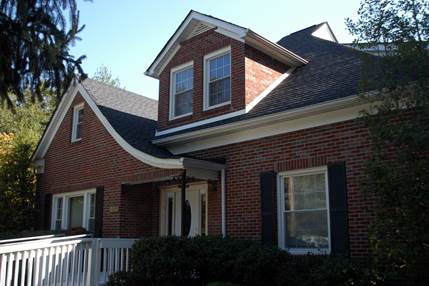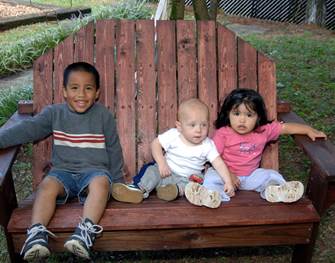Oak Haven Second Chance Home

Program Manager: Tracy Brookshire
Philosophy and Goal:The philosophy behind the establishment of the Oak Haven Second Chance Home is the belief that by providing a safe, stable, nurturing environment for teen mothers and their children, the negative effects of adolescent parenting can be reduced and the potential for the highest quality of life for both mother and child can be realized. The goal of the Oak Haven Second Chance Home is to provide services to teenage mothers and their children that will eliminate homelessness and unsafe living conditions, reduce child abuse and neglect, reduce the cycle of academic failure, and prevent repeat teen pregnancies. In addition, the long-term goal is to break the cycle of welfare dependence through the provision of timely and appropriate services to eligible teenage mothers and their children.
Evaluation: Oak Haven Second Chance Home is closely and rigorously evaluated annually by the Department of Human Resources, and the Office of Regulatory Services. These evaluations focus on every aspect of the program including staffing, documentation, facility, and the availability of mental health services, physical health services, and educational opportunities.
Program: Oak Haven is a fully licensed Second Chance Home. Each Oak Haven resident is provided with a continuum of care, from initial referral through transition into long term independent living. Oak Haven follows a model in which a teen mother and her child individually occupy a bedroom but share larger common spaces, bathrooms, and a kitchen. Oak Haven has created a home-like setting for its residents and was innovative in the development of an operational plan that has been used by other homes.
Oak Haven provides services to teen mothers to enable them to develop the skills and knowledge to be competent parents and to lead independent lives after completion of the program.

Often times the teen mother’s own childhood experiences provide limited guidance in the formation of nurturing parent-child relationships. Many teen mothers are faced with a limited understanding of how to actively support healthy childhood growth and development. Oak Haven provides opportunities for teen mothers to gain knowledge of child development and positive parenting practices. As a result, teen mothers gain realistic expectations for their child’s developmental progress and learn how to promote this progress. Oak Haven provides the education and support teen mothers need to develop nurturing parenting practices and to establish a strong parent-child attachment.
The residents are provided with basic life skills information, counseling, money management, parenting, housekeeping, menu planning and food preparation, leisure-time activities, and transportation. Other services include training in commercial sex trafficking, interpersonal skill building, effective communication, decision-making, first aid, and CPR. All residents are enrolled in an academic program, receive mental health services, and drug awareness and prevention classes. Physical health needs are ensured through regular physicals and health assessments, family planning, and emergency medical treatment when needed.
The benefits for the child residents at Oak Haven are significant. Many of the babies and young children are developmentally delayed when they arrive at Oak Haven. Child development screens are conducted at program entry using the Ages and Stages Questionnaires. The ASQ assesses a child's development in the areas of communication, gross motor, fine motor, problem-solving, personal-social and social-emotional. The ASQs are completed at age-based intervals and are used to identify and address suspected developmental delays. Children with developmental delays receive immediate intervention services to address those delays, thus making a life-long difference for some of the Oak Haven children. Screening young children is an effective, efficient way to catch problems and start treatment when it does the most good—during the crucial early years when the child’s brain and body are developing so rapidly. Because developmental and social-emotional delays can be subtle and can occur in children who appear to be developing typically, most children who would benefit from early intervention are not identified until after they start school. Research underscores the importance of early intervention: developmental delays, learning disorders, and behavioral and social-emotional problems are estimated to affect 1 in every 6 children and only 20% to 30% of these children are identified as needing help before school begins. Intervention prior to kindergarten has huge academic, social, and economic benefits. Studies have shown that children who receive early treatment for developmental delays are more likely to graduate from high school, hold jobs, live independently, and avoid teen pregnancy, delinquency, and violent crime. If social-emotional problems are identified and addressed early, children are less likely to be placed in special education programs—and later in life; they’re also less likely to experience school failure and unemployment. Studies show that when professionals use reliable and valid screening instruments, they are able to identify 70% to 80% of children with developmental delays.Objectives:
- To provide a safe, supportive living environment for both the teen mother and the child;
- To provide services that reflect, respect, and respond to the cultural, linguistic, and religious diversity of families served;
- To provide services which engage the child’s father and the extended family and encourage bonding;
- To conduct an intake assessment that measures the teen’s level of daily living skills, parenting skills, self-control, personal self-sufficiency and economic self-sufficiency;
- To deliver parenting education that shows an increase in knowledge in at least 90% of our residents; and
- To measure, monitor, and evaluate the physical, emotional, and social development of the teen mothers and their children.
Outcomes:
- Increased interval between subsequent pregnancies;
- Increased level of parent education and employment;
- Increased knowledge of child development;
- Increased knowledge of behavior management skills;
- Improved ability to implement positive parenting practices;
- Decreased rates of child abuse and neglect;
- Decreased number of children with undetected developmental delays entering the local school systems;
- Increased economic stability;
- Increased utilization of well-baby care and higher immunizations.
Ninety percent of participants who stay for a minimum of six months will have an increase in their level of daily living skills and self-sufficiency in the following areas: income, job readiness/employment, transportation, education, child care, housing, health care, substance abuse, community integration, and social/mental health functioning.
Program Success in 2021:
- All residents were enrolled in an educational program.
- Due to COVID all residents were able to complete online schooling if they had to be quarantined for any reason.
- All of our counseling, PAT and support services moved to online appointments.
- One former resident graduated from college.
- One former resident obtained legal custody after completing her case plan at Oak Haven.
- Oak Haven staff members maintained positive relationships with the majority of our former residents, resulting in 80% of follow-up contacts.
- All child residents were up to date on immunizations.
- Most of the child residents were developmentally on track, as evidenced by their ASQ scores.
- A three-year old resident had significant delays at birth. Through physical therapy and intensive work on the part of the staff and the child’s mother, the child is now flourishing. She child is currently involved in Babies Can't Wait and she is attending speech therapy. Her mother was 13 years old at the time of the child’s birth and has been living at Oak Haven for four years.
- One resident obtained her learner’s license
- All eligible residents worked jobs during the summer and/or attended summer school.



